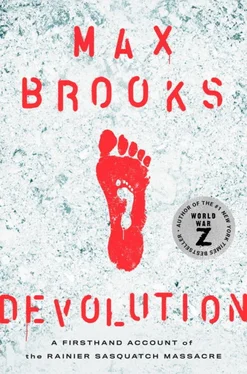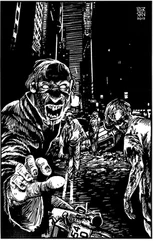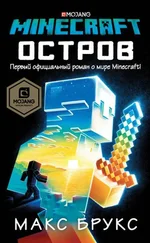He hadn’t really been listening, focused pensively on his tablet. “We’re running out of power.” He flipped the iPad around to face us. I recognized it as some kind of energy monitoring page, an icon of our house with the wall battery in yellow and the roof solar panels in orange. “I think the ash’s covered them.” He tapped the panels, which showed 25 percent. “Yours too.” He tilted the screen at Mostar and swiped over to her house. He explained that, normally, these “smart panels” would automatically signal the Cygnus maintenance team for immediate cleaning. But now…
“Do we really need electricity?” Mostar didn’t look too worried. “Losing the freezer means we’ll have to find other ways of preserving what we have, and eat first what we can’t. But trust me, when the power’s gone you realize what a luxury lightbulbs are.”
Dan countered with, “Not for the garden. When the shoots come up, they’re going to need a ton of artificial light, and warmth.” He explained that our heating system was electric, not gas, that all that homemade methane beneath our floor was only used for cooking and fireplaces. I asked, innocently, if the rain wouldn’t just wash the ash off our roof. Dan nodded, digesting what I’d said, which makes me realize now that it’s been so long since he’s actually done that with anything I’ve said.
He acknowledged I had a point, “but eventually, the rain’s gonna give way to snow.” He took a breath, then asked Mostar if she had a broom, and on her nod, perked up. “Great, I can just get up on the roof tomorrow and brush them off.”
“You can’t!” I surprised myself with how quickly that came out. “We…” I tried to find a “safe” answer. “We don’t have a ladder.”
“We can make one.” Dan was still positive, even enthusiastic. His eyes suddenly sparked with an idea. “The bamboo! I can cut some stalks, tie or tape them together and—”
“You’d get in trouble!” Okay, so maybe that wasn’t a lie. I did, do, always worry about getting in trouble, but it was still a “safe” answer and not the one I was really hiding. “The bamboo belongs to the whole community, and if we cut them down, won’t that…” I looked to Mostar for backup, and got nothing. Thanks, Mostar.
But off her silence, I said, “Maybe we can eat the bamboo!” It was a brilliant redirect, I thought, and honestly, a pretty good plan. “The shoots, we eat them all the time in ramen!” I actually don’t. I love ramen but I’ve always ordered it without the bamboo shoots. I’m sorry but they smell how I think horse manure would taste. Still, I tried to enlist Mostar again. “The neighbors might not mind us harvesting the shoots! And if we get enough, we might not even need the garden!”
I don’t think she meant to shoot me down. “Is this type of bamboo edible?”
Damn you, Mostar.
“I’ll just make a ladder.” Dan. The rise in his voice, the light in his eyes. “I can saw a few… do we have a saw?”
“But you’ll burn so many calories…,” I tried.
Dan didn’t hear me. “Maybe using the bread knife as a saw…”
“What if you fall!” There it was. The real reason I pushed back so hard. “There’s no doctor! And we can’t get you to a hospital! If you hit your head, break a leg…”
“What, you’re saying I’m not up to it?” Dan’s face, surprise verging on hurt. Dan’s not, how do I say this, the “athletic” type. And it’d never mattered, to either one of us, until now.
“She’s right.” Finally. Mostar nodded at me with glum recognition. “Injury turns you from a giver to a taker. Taking up our resources, our time to care for you. That’s why most weapons of war are designed to injure instead of kill. Wounded are more of a drain than the dead.”
Um, okay, I could have done without the obscure military trivia, but her argument produced the exact reaction I hoped for, and feared. Dan’s face fell, his shoulders sagged. I swallowed as he sighed and looked down at the table. I remember thinking this would undo everything, his whole new positive, productive attitude. Popped like a bubble. Back to depression. Back to the damn couch.
But then, suddenly he reinflated, tapping furiously at the iPad. “Maybe I can work on the efficiency settings for the houses. And maybe”—his eyes widened—“no, no maybe… we all donate a percentage of our electricity to the Common House to help charge the delivery vehicles. Why can’t we share power with each other? Your house to ours?”
The last sentence was directed at Mostar, who shrugged. Dan smiled at himself. I could have cried with relief. “That’ll buy us some time to think of something.” Still smiling at the screen, he reached out to grab my hand. “We’ll think of something!”
And then he was on his feet, clearing all our dishes and rushing them over to the sink. “Black hole sun…,” singing above the rush of water, “won’t you come, and wash away the rain…” He was scrubbing away, head bouncing to his own rhythm.
Mostar smiling at his back, then at my unconsciously shocked expression, leaned in and whispered, “How?” I knew exactly what she was talking about.
“I don’t…,” I stammered. “I mean… when his business…”
“This isn’t business,” Mostar whispered, “this is life or death. This is when the real you comes out.” She took my hand. “This is when, as the saying goes, adversity introduces us to ourselves.” [19] “Adversity introduces us to ourselves” was originally attributed to Albert Einstein, but spoken in this particular version by President George W. Bush on September 14, 2001, at the National Day of Prayer and Remembrance Service at the National Cathedral in Washington, D.C.
Then she sat back, nodding proudly at my husband. “Nice to meet you, Danny Holland.”
“Wha’?” he asked over his shoulder, to which Mostar replied, “Nothing.”
“Cool.” Dan grinned back at us, dramatically drying a cup. “Don’t worry, I’ll think of something.”
And by this morning, when I was writing that last entry, I saw what “something” was.
Using our bread knife, Dan cut down the longest stalk of bamboo he could find, trimmed away the branches, then attached it to Mostar’s broom with some of our packing tape. And it works. The first storm of ash that settled on the car told me that he’d reached the highest panels on our roof. If only he’d remembered to cover his nose and mouth! Dan went down coughing. So did I, when I got out of the car to help him. We coughed, sneezed, then laughed. It was a wonderful moment. Nice to meet you, Dan.
Then we heard someone scream.
Back behind the houses. Dan and I looked at each other, then ran into the alley between our home and the Perkins-Forsters’.
Palomino was still in the yard, alone at her apple tree. Effie and Carmen, grabbing each other’s hands, watched her from the back stoop. Nobody moved, nobody spoke.
A mountain lion! Long, skinny, with muddy paws and ash-covered fur. It stood right at the edge of the yard, eyes locked on Palomino.
What are you supposed to do! Make yourself bigger? Yell? Throw something? Run? What do you do when any mistake could be fatal?
Dan whispered, “Don’t move,” so close I could feel his warm breath on my ear. Palomino must have heard him because she turned in our direction. I could see Effie mouth something and hunch her shoulders toward her daughter. Carmen blocked her with one arm while lifting the other hand toward Palomino in a pained “stay still” gesture. But the girl wasn’t looking at her moms. Her eyes were on me. That expression. Fear. Pleading. I took a step toward her, then froze as the cat gave this low growl.
Palomino backed up half a step.
Читать дальше





![Traudl Junge - Hitler's Last Secretary - A Firsthand Account of Life with Hitler [aka Until the Final Hour]](/books/416681/traudl-junge-hitler-s-last-secretary-a-firsthand-thumb.webp)






